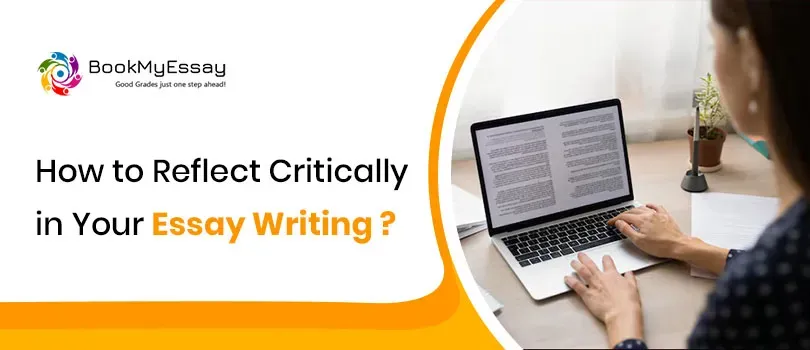Blog List

How to Reflect Critically in Your Essay Writing ?
2nd Mar 2026
Assignment Help
Reflective writing is more than just describing what happened. It requires you to analyze experiences, evaluate your thoughts, and connect learning outcomes with academic theories. Many students struggle with this process, which is why seeking Reflective Essay Writing Help online can make a significant difference. With expert guidance from BookMyEssay, you can learn how to reflect critically and improve your academic performance.
Understand the Purpose of Reflective Writing
Before you begin, it is important to understand what reflective writing truly means. A reflective essay explores your personal experiences and connects them with theoretical knowledge. Unlike narrative writing, it does not simply tell a story. Instead, it answers key questions such as:
-
What did I learn?
-
Why was this experience important?
-
How has it changed my understanding?
-
What would I do differently next time?
If you need structured guidance, using a free essay writing service online can help you understand the format and tone required for academic reflection.
Follow a Clear Structure
Critical reflection becomes easier when you follow a proper structure. Most reflective essays follow this format:
-
Introduction – Introduce the experience or topic.
-
Description – Briefly explain what happened.
-
Analysis – Critically evaluate the situation.
-
Conclusion – Summarize your learning and future actions.
The analysis section is the most important part. This is where you compare your experience with theories, academic concepts, or models. If you struggle with definitions and clarity, you may benefit from Definition Essay Writing Help online, which can help you understand key concepts before applying them.
Move Beyond Description
One of the biggest mistakes students make is focusing too much on describing events. Critical reflection requires analysis and evaluation. Instead of writing:
“I faced challenges during my group project.”
You should expand it to:
“I faced communication challenges during my group project, which highlighted the importance of leadership theories such as collaborative management. This experience improved my problem-solving skills and strengthened my teamwork abilities.”
This approach demonstrates deeper thinking and academic maturity.
Connect Theory with Practice
A strong reflective essay connects personal experience with academic theory. For example, if you are reflecting on a leadership experience, you can link it to leadership models studied in class. This shows that you understand both practical and theoretical aspects of the subject.
If you are unsure how to integrate research properly, consider seeking assistance from a Plagiarism Free Essay Writing Service to ensure originality and proper referencing. Professional guidance ensures your reflection remains authentic while meeting academic standards.
Be Honest and Self-Aware
Critical reflection requires honesty. Acknowledge your weaknesses and mistakes. Examiners appreciate self-awareness because it shows growth and maturity. Instead of blaming external factors, analyze your own role in the situation.
For example:
-
What could you have done better?
-
How did your attitude influence the outcome?
-
What skills do you need to improve?
Answering these questions strengthens your reflective writing.
Use Formal Academic Language
Although reflective essays are personal, they should still maintain a formal academic tone. Avoid slang, casual expressions, or overly emotional language. Support your reflections with evidence and references where necessary.
Students who struggle with language and formatting can benefit from expert support at BookMyEssay, which offers tailored solutions to improve writing clarity and structure.
Edit and Proofread Carefully
Critical reflection loses impact if your essay contains grammar errors or unclear sentences. Always review your work before submission. Check for:
-
Logical flow
-
Clear arguments
-
Proper referencing
-
Original content
Using a trusted Plagiarism Free Essay Writing Service ensures that your content is unique and meets academic integrity guidelines.
Final Thoughts
Learning how to reflect critically in your essay writing takes practice, patience, and guidance. Focus on analyzing experiences, connecting theory with practice, and demonstrating personal growth. If you need additional support, Reflective Essay Writing Help online from BookMyEssay can provide expert assistance tailored to your needs. With professional guidance, you can transform simple descriptions into powerful, critical reflections that impress your professors and enhance your academic success.

Why Is Canada Taxation Assignment Important?
28th Feb 2026
Plagiarism Checker
Taxation is one of the most crucial aspects of any country’s economy, and Canada is no exception. For students pursuing accounting, finance, or business management, understanding Canadian taxation is vital. This is why Canada Taxation assignments play a significant role in academic learning. These assignments help students gain a deep understanding of tax policies, regulations, and practical applications in real-world scenarios. With the increasing complexity of taxation laws, availing professional Canada Taxation assignment help can make a huge difference in achieving academic success.
Understanding the Complexity of Canadian Tax System
The Canadian tax system is multifaceted, involving federal and provincial taxes, corporate taxes, personal income taxes, and GST/HST regulations. For students, grasping these concepts requires more than theoretical knowledge—it demands practical problem-solving skills. Canada Taxation assignments are designed to simulate real-life taxation challenges, helping students learn how to calculate taxes, interpret laws, and apply them to various scenarios. These assignments also teach students to analyze tax planning strategies and understand compliance requirements, which are essential skills for a future career in accounting or finance.
The Role of Taxation Assignments in Skill Development
One of the main benefits of completing a Canada Taxation assignment is the development of critical skills. Students learn to interpret financial data accurately, make informed decisions, and apply taxation laws effectively. Moreover, these assignments enhance analytical thinking and problem-solving capabilities. For instance, by working on a case study involving corporate taxation, students can explore strategies to optimize tax liabilities while adhering to Canadian tax regulations. Such exercises not only build academic knowledge but also prepare students for professional roles in taxation, auditing, or financial consultancy.
Comparing with US Taxation for Broader Perspective
For students looking to expand their understanding beyond Canada, US Taxation Assignment Help provides an opportunity to compare and contrast two major taxation systems. The US tax system has unique rules regarding federal and state taxes, deductions, and exemptions, which differ from Canadian policies. By studying both systems, students gain a global perspective on taxation practices, which is increasingly valuable in multinational corporations and international finance roles. Assignments that integrate insights from both Canada and US taxation help students become versatile and competitive in the global job market.
Benefits of Canada Taxation Assignments
The benefits of Canada Taxation assignments extend beyond academic grades. Firstly, they enhance comprehension of complex tax laws, allowing students to confidently handle taxation tasks in professional settings. Secondly, these assignments improve research and writing skills, as students often need to analyze legislation, case laws, and taxation scenarios. Thirdly, assignments provide hands-on experience with tools and software used in taxation, which is crucial for modern accounting practices. Finally, completing these assignments under the guidance of experts, such as through Canada Taxation assignment help from BookMyEssay, ensures accuracy, clarity, and timely submission, reducing academic stress for students.
Why Students Choose BookMyEssay for Taxation Assignments
Students often face time constraints and struggle to balance multiple subjects. BookMyEssay offers specialized Canada Taxation assignment help that is tailored to meet university standards. Their team of experts ensures that every assignment is plagiarism-free, well-researched, and aligned with academic requirements. Additionally, BookMyEssay extends support for US Taxation Assignment Help, providing a comprehensive solution for students who need comparative analysis or international taxation knowledge. With professional assistance, students can confidently submit assignments that showcase their understanding and analytical skills, securing better grades and a strong foundation for their careers.
Conclusion
In conclusion, Canada Taxation assignments are more than just academic exercises—they are tools for building expertise, critical thinking, and professional readiness. With the increasing importance of taxation knowledge in finance and business careers, availing Canada Taxation assignment help ensures that students not only achieve academic excellence but also gain practical insights into the taxation landscape. Furthermore, exploring US Taxation Assignment Help and understanding the benefits of Canada Taxation assignments broadens a student’s perspective, preparing them for global opportunities in accounting and finance. BookMyEssay stands out as a reliable partner for students aiming to excel in taxation assignments while mastering the intricacies of the Canadian and US tax systems.
What Is the Difference Between Analysis and Results in a Dissertation?
27th Feb 2026
Plagiarism Checker
Writing a dissertation is a challenging task that requires careful planning, precise writing, and a clear understanding of the structure of academic research. Two of the most critical sections of any dissertation are the analysis and results sections. While students often confuse these, understanding the difference is crucial for presenting your research effectively. For students seeking guidance, professional Dissertation Analysis And Result Writing Help can provide clarity and ensure a polished dissertation.
Understanding the Results Section
The results section of a dissertation is where you present your research findings clearly and objectively. This section focuses on reporting the data collected during your study without interpretation. It’s about what you discovered, not why you discovered it. For instance, if your research involved surveys, experiments, or statistical analysis, this section will include tables, charts, and figures that summarize your findings.
A well-written results section should:
-
Present findings logically, often following the order of your research questions or hypotheses.
-
Include relevant tables, graphs, and charts to visually communicate data.
-
Avoid interpretation or discussion of the findings.
-
Remain concise and focused on key outcomes.
Many students struggle with presenting results clearly, which is why a Dissertation Writing Help Service like BookMyEssay can provide support. Professional writers ensure that your results section is structured, accurate, and aligns with academic standards.
Understanding the Analysis Section
While the results section presents data, the analysis section interprets and explains it. This is where you discuss the meaning of your findings, connect them to your research questions, and relate them to existing literature. The analysis transforms raw data into meaningful insights, helping readers understand the significance of your study.
Key aspects of the analysis section include:
-
Interpreting trends, patterns, and relationships observed in your results.
-
Explaining how findings answer research questions or support/reject hypotheses.
-
Comparing your results with existing studies to highlight similarities, differences, and implications.
-
Addressing unexpected findings or anomalies in the data.
Many students find the analysis section more challenging than the results section because it requires critical thinking and a strong understanding of the research topic. Professional Dissertation Editing Writing Services can help refine your analysis, ensuring your interpretations are clear, logical, and academically sound.
Key Differences Between Analysis and Results
To summarize, the main differences between analysis and results in a dissertation are:
-
Purpose:
-
Results: Report what you found.
-
Analysis: Explain what your findings mean.
-
-
Content:
-
Results: Raw data, tables, charts, and descriptive information.
-
Analysis: Interpretation, explanations, connections to literature, and critical insights.
-
-
Tone:
-
Results: Objective and factual.
-
Analysis: Analytical and evaluative.
-
Understanding these distinctions is crucial for producing a coherent dissertation. Confusing the two can make your dissertation appear disorganized and weaken your arguments.
How Professional Help Can Improve Your Dissertation
Many students struggle with differentiating these sections, leading to confusion and lower grades. Dissertation Analysis And Result Writing Help from BookMyEssay can guide you through structuring these sections effectively. Similarly, Dissertation Writing Help Service Dissertation Editing Writing Services can polish your work, ensuring clarity, academic accuracy, and compliance with formatting standards. By leveraging professional support, students can focus on research quality while ensuring their dissertation communicates findings and insights effectively.
Conclusion
In essence, the results and analysis sections of a dissertation serve distinct but complementary purposes. The results section focuses on presenting your research findings objectively, while the analysis section interprets these findings and situates them within the broader academic context. Understanding this distinction is essential for writing a strong dissertation. With expert assistance from BookMyEssay, students can overcome challenges, produce high-quality work, and achieve academic success. Professional Dissertation Analysis And Result Writing Help and Dissertation Writing Help Service Dissertation Editing Writing Services ensure that every aspect of your dissertation is well-structured, insightful, and academically rigorous.
How to Write a Perfect Letter Format for an Assignment?
26th Feb 2026
Assignment Help
Writing a letter for an assignment might seem simple, but achieving the perfect structure requires attention to detail and understanding of different letter types. Whether you are tasked with a personal, business, or character letter, knowing the correct format ensures clarity, professionalism, and effectiveness. For students seeking guidance, services like BookMyEssay provide expert support on how to write letter format Assignment Help and more.
Understanding the Basics of Letter Writing
A letter typically consists of several key elements: the sender’s address, the date, the recipient’s address, a salutation, the body, and a closing. Each type of letter has its unique nuances, so it’s crucial to follow the correct format.
-
Sender’s Address: Begin by writing your address at the top-right corner of the page. This is where the recipient can contact you if necessary.
-
Date: Below the sender’s address, mention the date in a clear format, such as “26 February 2026.”
-
Recipient’s Address: On the left, write the recipient’s address, including name, designation, and organization if it’s a formal letter.
-
Salutation: Use “Dear [Name]” for personal letters and “Respected Sir/Madam” for formal or business letters.
Personal Letter Format Assignment Help
Personal letters are informal and usually written to friends, family, or acquaintances. The tone can be conversational, but the structure must remain organized. The body of a personal letter typically includes:
-
Introduction: Start with a warm greeting and mention the purpose of writing.
-
Main Content: Share your news, experiences, or request. Keep paragraphs clear and concise.
-
Conclusion: End with well-wishes, expressing hope or gratitude.
For students struggling with the nuances, BookMyEssay offers Personal letter format assignment help, providing guidance on phrasing, tone, and structure to ensure a high-quality submission.
Business Letter Format Sample Assignment Help
Business letters are formal and professional. They follow a strict structure and tone. Key elements include:
-
Subject Line: A concise summary of the letter’s purpose.
-
Body: Organized in paragraphs, presenting information logically. Avoid slang or overly casual language.
-
Closing: Use formal sign-offs such as “Sincerely” or “Yours faithfully.”
If you are unsure how to format a business letter correctly, you can rely on BookMyEssay for business letter format sample Assignment Help, which provides examples and templates tailored to academic requirements.
Character Letter Format Assignment Help
Character letters, often required for job applications, internships, or academic purposes, highlight a person’s qualities, ethics, and achievements. A proper character letter should include:
-
Introduction: Identify the relationship with the person and the purpose of writing.
-
Body: Highlight specific qualities, achievements, and examples that reflect the person’s character.
-
Conclusion: Reaffirm your recommendation or assessment clearly and confidently.
Students seeking guidance can access character letter format Assignment Help through BookMyEssay, ensuring their letters meet academic and professional standards.
Tips for Writing a Perfect Letter Assignment
-
Know Your Letter Type: Identify whether it’s personal, business, or character to use the appropriate tone and structure.
Be Clear and Concise: Avoid unnecessary information. Stick to the main points.
Proofread: Check grammar, spelling, and punctuation to avoid errors.
Follow Formatting Guidelines: Margins, spacing, and alignment must adhere to academic standards.
Seek Expert Assistance: When in doubt, expert services like BookMyEssay can provide personalized guidance on how to write letter format Assignment Help and ensure your letter earns top marks.
Conclusion
Mastering letter writing for assignments requires understanding the structure, tone, and purpose of each type of letter. Whether it’s a personal note, a business communication, or a character recommendation, following a clear format is essential. Services like BookMyEssay make it easier by offering Personal letter format assignment help, business letter format sample Assignment Help, and character letter format Assignment Help, giving students the confidence to submit flawless assignments.

How Students Can Benefit from Websites That Write Content ?
25th Feb 2026
Student Assignment Help
In today’s fast-paced academic environment, students often face the challenge of balancing multiple assignments, exams, and personal commitments. The pressure to produce high-quality work within tight deadlines can be overwhelming. Fortunately, technology has provided students with a solution through websites that write essays for you free. These platforms are designed to make the writing process easier, faster, and more efficient, allowing students to focus on other important aspects of their studies.
Time Management Made Easy
One of the most significant advantages of using websites to write essays is the incredible time-saving aspect. Writing a well-researched essay requires hours of planning, research, drafting, and editing. By using a website that writes essays, students can delegate part of this workload to an online tool, freeing up valuable time to focus on other assignments, projects, or personal commitments. This can be particularly helpful during exam season, when every hour counts.
Access to Expert Assistance
Many websites offering essay writing services provide access to professional writers and academic experts. These experts understand the nuances of academic writing and can produce essays that meet high standards of quality and originality. Whether you need a full-length research paper or short essay writing help, these platforms can provide guidance that ensures your work is well-structured, thoroughly researched, and plagiarism-free. With expert assistance, students can improve their understanding of the subject matter and learn effective writing techniques.
Improved Writing Skills
Using a website that writes essays is not just about saving time—it can also be a valuable learning tool. When students review the essays provided by these websites, they can observe proper formatting, citation styles, and effective argumentation techniques. This exposure can help students develop their own writing skills over time. By analyzing professional examples, students gain insights into structuring arguments, integrating evidence, and enhancing their vocabulary, ultimately becoming more confident writers.
Stress Reduction and Academic Confidence
Academic stress is a common issue among students, and struggling with essay writing can exacerbate this problem. Websites to write essays offer a stress-free alternative that allows students to meet deadlines without sacrificing quality. Knowing that they have access to reliable support can boost students’ confidence in their academic abilities. With reduced stress levels, students are more likely to stay motivated, maintain a positive mindset, and perform better across their courses.
Affordable and Convenient Solutions
Many online essay writing platforms, including websites that write essays for you free, offer cost-effective solutions for students on a budget. These platforms provide flexible options, from free essay generators to paid professional services, catering to different academic needs. The convenience of online access means students can request assistance anytime, anywhere, making it a practical solution for busy schedules.
Ethical Considerations and Responsible Use
While these tools are highly beneficial, it’s important for students to use them responsibly. Platforms like BookMyEssay emphasize that students should use these essays as references or guides rather than submitting them as their own work. This approach ensures academic integrity while still reaping the benefits of professional writing support. By learning from these resources, students can enhance their skills without compromising ethical standards.
Conclusion
In conclusion, websites that write essays for you free and other essay-writing platforms provide students with numerous advantages, from saving time and reducing stress to improving writing skills and boosting confidence. With access to expert guidance and flexible solutions, students can manage their academic workload more effectively and achieve better results. Whether you’re looking for short essay writing help or comprehensive research papers, utilizing a website that writes essays like BookMyEssay can be a game-changer for academic success.
By leveraging these online tools responsibly, students not only complete assignments efficiently but also gain valuable insights into academic writing, helping them excel both now and in their future careers.

How to Choose the Right Grammar Check Tool?
24th Feb 2026
Plagiarism Checker
Choosing the right grammar tool is essential for students who want to submit polished, high-quality assignments. With so many options available, it can be confusing to decide which one truly meets your academic needs. If you are searching for a reliable grammar check free online solution, understanding the key features and benefits of each tool can make your decision easier. With expert guidance from BookMyEssay, students can also enhance their writing accuracy and overall academic performance.
Why a Grammar Check Tool Matters
Grammar plays a vital role in academic writing. Even a well-researched assignment can lose marks due to spelling errors, punctuation mistakes, or incorrect sentence structure. A dependable professional grammar check tool assignment help service ensures that your content is clear, concise, and grammatically accurate. It improves readability, enhances vocabulary usage, and eliminates embarrassing errors before submission.
Key Features to Look For
When selecting the best grammar check free online tool, consider the following features:
Accuracy and Advanced Detection
The primary purpose of a grammar checker is to detect errors accurately. Choose a tool that not only corrects basic spelling mistakes but also identifies complex grammatical issues, contextual errors, and tone inconsistencies. Advanced AI-based tools are often more reliable for academic writing.
Plagiarism Checking Support
Many students prefer tools that combine grammar correction with plagiarism detection. While grammar tools focus on language accuracy, integrated plagiarism checkers ensure originality, which is essential for academic submissions.
User-Friendly Interface
A simple and easy-to-use interface saves time. The tool should allow you to paste your content quickly and receive instant suggestions. Complicated dashboards can slow down your workflow, especially when working under tight deadlines.
Academic Writing Suggestions
Not all grammar tools are designed for academic purposes. Look for a professional grammar check tool assignment help option that provides formal tone suggestions, academic vocabulary improvements, and citation-related corrections.
Real-Time Corrections
Some tools offer real-time corrections while you type. This feature is extremely useful for students working on essays, reports, or dissertations. It allows you to learn from your mistakes instantly.
Free vs. Professional Grammar Tools
While a grammar check free online tool is helpful for quick corrections, it may have limitations. Free versions often provide only basic spelling and grammar suggestions. On the other hand, professional tools offer deeper analysis, style improvements, clarity suggestions, and even sentence restructuring.
Students who require comprehensive online grammar check assignment help may benefit more from professional services. These tools provide detailed explanations for corrections, helping you improve your writing skills over time.
Compatibility and Accessibility
Before choosing a grammar tool, check its compatibility. Does it work on multiple devices? Can it integrate with Microsoft Word or Google Docs? A flexible tool that works across platforms ensures convenience and efficiency. Accessibility is especially important for students managing multiple assignments simultaneously.
Reviews and Reliability
Reading user reviews and checking ratings can help you identify reliable tools. Look for feedback from other students or academic writers. A trusted service like BookMyEssay not only recommends effective tools but also provides expert proofreading and editing support for students seeking professional guidance.
When to Seek Expert Help
Grammar tools are helpful, but they cannot fully replace human expertise. Automated tools may miss context-based errors or subject-specific writing nuances. If you are preparing a critical assignment, thesis, or research paper, combining a grammar tool with online grammar check assignment help from professionals ensures maximum accuracy and quality.
Final Thoughts
Choosing the right grammar checker depends on your academic requirements, budget, and writing goals. Start with a reliable grammar check free online option for basic corrections, but consider upgrading to a professional grammar check tool assignment help service for in-depth analysis. For complete academic support, including editing, proofreading, and expert advice, BookMyEssay can help you submit error-free and high-quality assignments with confidence

How to Write Clean Code in Your Coding Assignment?
23rd Feb 2026
Plagiarism Checker
Writing clean code is one of the most important skills students can develop while working on programming projects. Whether you are a beginner or an advanced learner, submitting a well-structured and readable coding project can significantly improve your grades. If you ever need help with coding assignment help, platforms like BookMyEssay can
Understand the Problem Clearly
Before writing a single line of code, carefully read and understand the assignment requirements. Break the problem into smaller parts and create a clear plan. Identify inputs, outputs, and the logic needed to connect them. When students rush into coding without proper planning, they often create messy and confusing programs. Taking time to analyze the task ensures clarity and reduces errors later.
If the problem feels complicated, seeking help with coding assignment help services can provide expert guidance and simplify the concept for you.
Use Meaningful Variable and Function Names
Clean code starts with readable names. Avoid using single-letter variables like “x” or “a” unless absolutely necessary. Instead, use descriptive names such as or . Meaningful naming makes your code easier to understand for both you and your instructor.
This practice is similar to structured academic tasks like Lesson Planning Assignment Help, where clarity and organization are essential. Just like a lesson plan needs clear objectives, your code needs clear identifiers.
Follow Proper Formatting and Indentation
Indentation and spacing are crucial in coding. Consistent formatting makes your program visually clean and easy to follow. Use proper indentation for loops, conditionals, and functions. Most programming languages have style guides—follow them strictly.
For example:
-
Keep consistent spacing.
-
Avoid long, unreadable lines.
-
Organize code blocks properly.
Neatly formatted code reflects professionalism and strong understanding, much like structured reports in Quality Management assignment help, where systematic presentation is highly valued.
Write Modular Code
Instead of writing one large block of code, divide your program into smaller functions or modules. Each function should perform one specific task. Modular coding improves readability, simplifies debugging, and enhances reusability.
For example, if your assignment involves calculating grades and displaying results, create separate functions:
-
One for calculation
-
One for validation
-
One for display
This method keeps your logic organized and easy to maintain.
Add Clear and Relevant Comments
Comments explain what your code is doing. However, avoid excessive or unnecessary comments. Write comments only where the logic may not be obvious. Clear comments help instructors understand your approach and make debugging easier.
For students seeking help with coding assignment help, experts often recommend commenting on complex sections rather than every line.
Avoid Repetition (Follow DRY Principle)
DRY stands for “Don’t Repeat Yourself.” Repeating the same code multiple times makes your assignment messy and harder to maintain. Instead, use loops, functions, or reusable components to handle repeated tasks.
Clean code is efficient code. Eliminating redundancy improves performance and demonstrates logical thinking.
Test and Debug Regularly
Clean code is not just about writing—it’s also about testing. Run your program frequently to identify and fix errors early. Debugging in small steps prevents confusion later.
Use:
-
Test cases
-
Sample inputs
-
Edge cases
This habit ensures your final submission works smoothly and meets all requirements.
Follow Best Coding Practices
Every programming language has best practices. Learn and apply them in your assignments. This includes:
-
Using appropriate data structures
-
Handling exceptions properly
-
Writing secure and optimized logic
Students who consistently apply best practices often perform better academically. If you feel stuck, BookMyEssay provides reliable academic support, including Lesson Planning Assignment Help, Quality Management assignment help, and programming guidance.
Review Before Submission
Before submitting your coding assignment, review your entire program. Check for:
-
Logical errors
-
Unused variables
-
Spelling mistakes
-
Proper documentation
A final review ensures your code is clean, structured, and professional.
Conclusion
Writing clean code in your coding assignment is not just about making it work—it’s about making it understandable, efficient, and well-organized. By planning carefully, using meaningful names, writing modular functions, and following best practices, you can significantly improve your academic performance.
If you need expert guidance, help with coding assignment help services from BookMyEssay can support you in delivering high-quality, plagiarism-free assignments on time. Clean code reflects clear thinking—and clear thinking leads to academic success.

How Students Can Master Creo 5.0 Assignments Quickly?
21st Feb 2026
Assignment Help
In today’s fast-paced academic world, engineering and design students often struggle to manage complex software tasks while keeping up with deadlines. One such challenge is mastering Creo 5.0 assignments. Creo 5.0, a powerful CAD software, is widely used for 3D modeling, product design, and simulation. Its advanced features can overwhelm beginners, making it essential for students to seek professional support. Services like BookMyEssay offer specialized Creo 5.0 assignment help that ensures students submit accurate, well-structured assignments on time.
Understanding the Challenges of Creo 5.0
Creo 5.0 is not just another design software; it demands technical expertise in 3D modeling, assembly, and parametric design. Many students struggle with creating precise parts, designing assemblies, or simulating real-world scenarios. Lack of time, insufficient knowledge, and strict deadlines further complicate the process. This is where Essay Written for You assignment help comes into play, providing step-by-step solutions and practical examples to help students grasp complex concepts quickly.
Benefits of Professional Assignment Help
Seeking professional assistance can drastically improve a student’s performance. With services like Help with Exam Assignment and Write my Paper For me Assignment Help, students can focus on understanding concepts rather than worrying about formatting or technical errors. Here are a few benefits of opting for professional help:
-
Time Management: Professional assistance allows students to save valuable time and focus on learning other essential subjects.
-
Accuracy and Quality: Expert writers and CAD professionals ensure that every assignment is error-free and meets academic standards.
-
Customized Solutions: Each solution is tailored to the student’s requirements, making learning more effective.
-
Better Grades: High-quality submissions increase the chances of securing top grades.
Tips to Master Creo 5.0 Assignments
While professional help is invaluable, students can also adopt a few strategies to improve their skills independently:
-
Practice Regularly: Repeatedly working on 3D models and assemblies strengthens understanding.
-
Use Tutorials: Online tutorials and guides for Creo 5.0 can help students understand complex features.
-
Join Forums: Participating in online forums enables students to share ideas and solve challenges collectively.
-
Break Down Tasks: Dividing assignments into smaller tasks reduces stress and improves efficiency.
How BookMyEssay Supports Students
BookMyEssay is a trusted platform for students looking for reliable assignment help. Their Creo 5.0 assignment help team includes experienced professionals who provide accurate solutions in a timely manner. Beyond CAD assignments, the platform also offers comprehensive services like Essay Written for You assignment help, Help with Exam Assignment, and Write my Paper For me Assignment Help. This ensures that students receive support across multiple academic challenges, from essay writing to exam preparation.
By using BookMyEssay’s services, students not only meet deadlines but also learn techniques that enhance their understanding of Creo 5.0. Moreover, the platform guarantees plagiarism-free work, proper referencing, and solutions tailored to individual academic requirements.
Conclusion
Mastering Creo 5.0 assignments does not have to be a daunting task. By combining consistent practice, online resources, and professional assistance from platforms like BookMyEssay, students can achieve academic success efficiently. Whether it’s technical guidance, essay support, or exam assistance, services like Creo 5.0 assignment help, Essay Written for You assignment help, Help with Exam Assignment, and Write my Paper For me Assignment Help provide the right tools for academic excellence.
With the right support and a proactive approach, students can not only complete their assignments on time but also gain valuable skills that will benefit their future engineering careers.
If you want, I can also create 5 catchy blog titles and 5 Instagram captions based on this post that are optimized for your keywords to boost engagement. It would make your content more clickable and shareable. Do you want me to do that next?

How Do You Write a Term Paper Without Last-Minute Stress?
20th Feb 2026
Plagiarism Checker
Writing a term paper can often feel overwhelming, especially when deadlines are looming. Many students struggle to balance research, writing, and formatting, leading to unnecessary stress. The key to avoiding last-minute panic is planning and knowing where to seek support. Services like BookMyEssay offer reliable solutions, including term paper writing help online, Buy Essay Paper Writing Help, reflection paper writing help, and Coursework Paper Writing Help to guide students through the process.
Start Early and Plan Ahead
One of the simplest ways to prevent last-minute stress is to begin early. Start by understanding the assignment requirements thoroughly. Break your paper into manageable sections: introduction, literature review, methodology, discussion, and conclusion. Create a timeline, allocating time for research, drafting, editing, and final proofreading. Early preparation allows you to avoid the common trap of cramming and rushed work.
Conduct Thorough Research
Effective term papers require solid research. Use credible academic sources such as journals, books, and online databases. Organize your references and make notes as you go to simplify the writing process. If you feel unsure about research strategies, BookMyEssay offers term paper writing help online, providing expert guidance on collecting relevant material and structuring it coherently. This ensures your paper is well-informed and academically sound.
Create an Outline
Drafting an outline before you start writing saves time and improves clarity. List your main points under each section and note down supporting evidence. An outline acts as a roadmap, helping you stay focused and avoid wandering off-topic. If organizing ideas feels challenging, Buy Essay Paper Writing Help from BookMyEssay can assist in creating structured and logical outlines, tailored to your assignment’s requirements.
Write in Drafts
Avoid aiming for perfection on the first try. Start by writing a rough draft to get your ideas down on paper. Focus on expressing your thoughts clearly, without worrying about grammar or citations initially. Once the draft is complete, you can revise for clarity, coherence, and academic tone. Services like reflection paper writing help offered by BookMyEssay can guide you in refining your drafts and ensuring your arguments are persuasive and well-structured.
Stay Consistent with Formatting
Academic papers require proper formatting according to styles like APA, MLA, or Chicago. Consistency in citations, headings, and references is crucial. Paying attention to these details early reduces the risk of last-minute formatting errors. If this seems tedious, Coursework Paper Writing Help from BookMyEssay can take care of formatting issues, allowing you to focus on content quality.
Review and Proofread
Proofreading is a step you shouldn’t skip. Carefully check for grammatical errors, spelling mistakes, and logical inconsistencies. Reading your paper aloud can help identify awkward phrasing or unclear sentences. Professional services like BookMyEssay also provide editing and proofreading support to ensure your final submission is polished and academically impressive.
Seek Support When Needed
Even with planning, some assignments can feel overwhelming. Don’t hesitate to seek help. Term paper writing help online, Buy Essay Paper Writing Help, reflection paper writing help, and Coursework Paper Writing Help from BookMyEssay ensure that students receive expert guidance, customized to meet deadlines without compromising quality. With expert support, you can manage your workload efficiently and submit high-quality work stress-free.
Conclusion
Writing a term paper without last-minute stress is achievable with careful planning, structured research, and consistent writing habits. By starting early, organizing your thoughts, and seeking expert guidance from BookMyEssay, you can tackle any assignment confidently. Utilizing professional services for drafting, formatting, or reflecting on your work not only saves time but also enhances the quality of your paper. Avoid stress, embrace preparation, and let reliable academic support guide you toward success.

What Makes a Paraphrasing Tool Truly Professional?
19th Feb 2026
Programing Assignment Help
In today’s academic environment, students often face the challenge of presenting ideas in their own words without compromising quality. This is where a professional paraphrasing tool becomes invaluable. Whether you are writing an essay, research paper, or assignment, using a tool that ensures accuracy, clarity, and originality is crucial. But what truly defines a professional paraphrasing tool? Let’s explore the features and benefits that make these tools stand out.
Accuracy and Context Preservation
A truly professional paraphrasing tool does more than just replace words with synonyms. It understands the context of your content and maintains the original meaning while improving sentence structure and readability. This is particularly important for academic work, where misinterpretation of content can negatively affect your grades. A reliable tool ensures that your ideas remain intact, and your writing is enhanced for clarity and flow.
Plagiarism-Free Output
One of the biggest concerns for students is plagiarism. Using a paraphrasing tool free Assignment Help service allows students to rephrase their work without unintentionally copying existing content. Professional tools integrate advanced algorithms to ensure your text is unique and original, which is essential for maintaining academic integrity. Pairing this with plagiarism checkers can further safeguard your work from potential issues.
Integration with Academic Citations
High-quality paraphrasing tools often include features that support proper academic referencing. For instance, a Harvard citation generator assignment help feature ensures that any references or quotes in your text are correctly formatted according to Harvard style. This is a crucial benefit for students who struggle with citation rules, as it saves time and ensures adherence to academic standards. By combining paraphrasing with citation support, students can produce polished, credible, and academically sound papers.
User-Friendly Interface and Accessibility
A professional paraphrasing tool should be easy to use and accessible across platforms. Students need tools that allow quick copy-pasting of text, generate results promptly, and provide suggestions for improvement. User-friendly interfaces not only save time but also reduce the learning curve, enabling students to focus more on content rather than figuring out how the tool works. Tools that offer cloud access or integration with online learning platforms add additional convenience for busy students.
Customization and Advanced Features
The best professional paraphrasing tools offer customizable options, such as adjusting the level of rewriting or selecting academic-specific vocabulary. Advanced tools also provide features like summarization, grammar checks, and style enhancement. Such versatility allows students to tailor their writing according to assignment requirements and academic standards. These tools are particularly useful for complex assignments that demand precision and a formal tone.
Why Students Prefer BookMyEssay
At BookMyEssay, students can access a reliable professional paraphrasing tool along with paraphrasing tool free Assignment Help and Harvard citation generator assignment help. BookMyEssay ensures that students receive plagiarism-free, academically sound, and properly formatted assignments. Their tools combine technology with expert guidance, making it easier for students to meet deadlines while maintaining quality. With BookMyEssay, students are not just getting a tool—they are gaining a comprehensive support system for academic excellence.
Conclusion
A professional paraphrasing tool is not just about changing words; it’s about enhancing your writing while preserving the original meaning. Features such as context-aware rephrasing, plagiarism-free output, citation support, user-friendly design, and advanced customization make a paraphrasing tool truly professional. For students seeking high-quality academic assistance, combining these tools with services from BookMyEssay ensures efficiency, credibility, and improved academic performance. Whether it’s rewriting an essay, preparing an assignment, or generating accurate citations, a professional paraphrasing tool is an indispensable resource for every student.
Get A Free Quote



 3 Bellbridge Dr, Hoppers Crossing, Melbourne VIC 3029
3 Bellbridge Dr, Hoppers Crossing, Melbourne VIC 3029




